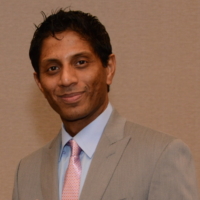CCC at AAAS 2023
The Computing Community Consortium (CCC) has attended and hosted sessions at the American Association for the Advancement of Science (AAAS) Annual Meeting since 2013. Below you can find the upcoming CCC sponsored AAAS sessions for the 2023 AAAS Annual Meeting. To learn more about the event visit the webpage.
Health Equity: How can algorithms and data mitigate, not exacerbate, harms?
Saturday, March 4th, 4:00-5:00 PM EST
Synopsis: AI has tremendous promise to help us proactively identify people at risk and personalized medical interventions, however the actual implementation of artificial intelligence (AI) in medicine has suffered from two problems – leaving certain demographics out and overfitting algorithms to possibly harm people. It is essential to ensure that advances enabled by AI in computational medicine will mitigate, and not exacerbate, demographic disparities in healthcare. This panel will recommend best practices for the development of equitable approaches through the pipeline of computational medicine including: data collection; algorithm development, evaluation, and deployment; and intervention and mitigation efforts from molecular to clinical approaches. We will discuss how it is essential to include diverse racial and other demographic information in datasets, and how algorithms must be both cognizant of racism and not perpetuate racial bias in algorithm development. The panel will explain how racial bias in algorithms and exclusion of racial data in molecular, diagnostic and clinical studies led to inadequate treatment during the COVID-19 pandemic and for chronic health conditions such as kidney disease. More generally, we discuss paths forward to use algorithms to improve health and mitigate societal inequities.
Speakers:

Amaka Eneanya
University of Pennsylvania
Presentation Title: Lessons Learned from Using Race to Diagnose and Manage Kidney Disease
This talk will review the root cause of racial disparities in health outcomes including the impact of structural racism and discrimination on kidney disease. Additionally, this talk will feature the story of race and estimated glomerular filtration rate (eGFR) equations, how they came into practice, and the pitfalls associated with their use.
 Melanie Moses
Melanie Moses
University of New Mexico
Presentation Title: When Algorithms Interact: how medical algorithms affect social outcomes
Algorithms make life-altering decisions in criminal justice, employment and finance; these systems interact with medical algorithms. Medical algorithms determined whether prisoners were sufficiently vulnerable to COVID-19 to be released. Other algorithms mistakenly equated medical spending with medical need, denying care to African American patients. This talk highlights how algorithms interact in complex ways and how bias mitigation in other domains suggests a path forward for medicine.
 Mona Singh
Mona Singh
Princeton University
Presentation Title: Equitable Machine Learning in Genome Medicine: challenges and opportunities
Genomics holds great promise to deliver personalized treatments in the clinic, especially in the cancer context. However, existing genomic and functional datasets do not have an adequate number of samples for diverse racial and ethnic groups. We will overview the difficulties in detecting whether machine learning methods trained on these genomic data are performing equitably, highlight possible machine learning solutions, and propose algorithmic strategies to prioritize data collection to mitigate inequities.
Related Resources:
Speaker Slides
Check back soon
Articles
- Challenging the Use of Race in the Vaginal Birth after Cesarean Section Calculator
- A New Formula May Help Black Patients’ Access to Kidney Care
- Estimating Glomerular Filtration Rate
- Removal of Race from Estimation of Kidney Function
- How a Race-Based Medical Formula is Keeping Some Black Men in Prison
- New Creatinine and Cystatin C-Based Equations to Estimate GFR without Race
Videos
Check back soon
Sustaining Computing Research Communities in a Hybrid World
Saturday, March 4th, 2:30-3:30 PM EDT
Synopsis: We are living in a hybrid world, which impacts our technical research communities in different ways – some that are predictable and others not so much. Remote work and virtual conference participation has become an integral part of our lives; one that is here to stay. COVID brought an explosion of remote work technologies from video platforms and conferencing systems to robotics. We can all agree that there are trade-offs between in-person and virtual events. While in-person events offer companionship and networking opportunities, virtual events save money, time, may be more climate friendly and provide greater accessibility to participants. We must capitalize on the benefits, minimize the deficiencies and integrate hybrid aspects into a new successful, optimal path forward. This panel will debate the negative and positive aspects of in-person vs. virtual participation, identify areas for technological improvement, and explore hybrid solutions to serve our research communities
Speakers:

Brent Hecht
Microsoft Research
Presentation Title: Navigating the Complexity and Heterogeneity of the Conference Design Problem
As scientists, it is critical that we take a structured, empirical approach to designing our conferences. This is especially the case given the complexity and heterogeneity of many of the most important variables involved, e.g. innovation, collaboration networks, and career outcomes. I’ll review some of the limited empirical data we have so far about the costs and benefits of in-person conferences and suggest important directions for future work.

Richard Ladner
University of Washington
Presentation Title: The Challenge of Making Hybrid Meetings Accessible
An accessible hybrid meeting would be one that persons with disabilities could attend and enjoy either in person or online. Some accessibility needs are the same whether in person or online such as sign language interpreters or captioning access. Other accessibility needs are more specific for in person attendance such as wheelchair accessibility to the venue. Adequate planning and funding are needed to make a hybrid meeting accessible for the variety of accessibility needs.

Cristina Videira Lopes
University of California, Irvine
Presentation Title: Hybrid Conferences and Climate Change
Research communities like ours have depended on in-person international conferences for the advancement of science and technology. However, the travel that is required contributes to greenhouse gas emissions, which in part cause climate change. As responsible earthlings, we must find better ways to have scientific discourse that is effective as well as climate friendly. This talk will touch upon the technological and non-technological challenges of building effective immersive hybrid spaces.
Moderator:
Sujata Banerjee
VMware Research
Related Resources:
Speaker Slides
Check back soon
Articles
General Articles and Blogs
- CCC Meta Hybrid Visioning Activity Report Out
- CCC white paper “Robotics Enabling the Workforce“
- 13 Rules for Successful Hybrid Meetings: Lessons from 100 Articles
- Distance matters
- New Microsoft Study of 60,000 Employees: Remote Work Threatens Long-Term Innovation
- My hybrid conference wishlist
Accessibility
- SIGACCESS Guide to Accessible Virtual Conferences
- SIGACCESS Guide to Accessible Conferences
- Behind the scenes of axe-con: building a large, accessible
- Accessibility in Third-Party Products and Services
Technology
Sustainability
- Please let us know if you have recommendations
Social Factors
- Social Presence in Virtual Event Spaces – CHI Presence Workshop Submission Draft
Videos
Check back soon
Emerging Election Technologies Enhancing Integrity, Transparency, and Confidence
Friday, March 3rd, 2:30-3:30 PM EDT
Synopsis: The integrity of democratic elections has been called into question in recent years both within and outside of the U.S. Electoral systems currently in widespread public use give voters little if any direct evidence that the announced tallies accurately reflect the votes that were cast. This panel will discuss emerging technologies that enhance transparency of elections by providing substantive evidence and which thereby improve integrity and confidence.
Specifically, panelists will discuss risk-limiting audits – which allow efficient matching of announced tallies with physical ballots – and end-to-end verifiability – which allows voters to confirm that their votes have been accurately recorded and counted without compromising voter privacy. These technologies do not require trust in software, hardware, or even personnel and are starting to be used in elections to provide direct public evidence of the accuracy of election results
Speakers:
![]()
Josh Benaloh
Microsoft Research
Presentation Title: Emerging Election Technologies Enhancing Integrity, Transparency, and Confidence
Josh Benaloh is a leading expert and innovator in end-to-end verifiable election technologies. He will offer the audience an introduction to what they achieve, how they work, and where they stand on the road to widespread deployment.

Philip B. Stark
University of California, Berkeley
Presentation Title: Emerging Election Technologies Enhancing Integrity, Transparency, and Confidence
Philip Stark is the primary inventor of risk-limiting audits. This technology provides solid public evidence that the announced winners of an election are consistent with the record of paper ballots cast by voters. The use of this technology has grown widely in recent years and is now required by statute in several states.

Poorvi L. Vora
The George Washington University
Presentation Title: Emerging Election Technologies Enhancing Integrity, Transparency, and Confidence
Poorvi Vora has done extensive original research in both end-to-end verifiability and risk-limiting audits. She has been involved in public deployments as early as 2009 and will offer her unique perspective on the challenges and successes in bringing these technologies from research to practice.
Related Resources:
Speaker Slides
Check back soon
Articles
- CCC white paper “Research Opportunities in Evidence-Based Elections“
Videos
Check back soon
Maintaining a Rich Breadth for Artificial Intelligence
Sunday, March 5th, 1:00-2:00 PM EDT
Synopsis: AI is receiving a lot of attention lately, and most of this attention seems to be focused on one small (but important) subarea of AI, deep learning. In order to succeed, the many dimensions of diversity must be reflected in AI research. We do not just mean diversity of people, but also diversity of ideas, theories, methods, projects, evaluation systems, and more. This panel brings together a group of AI experts to discuss the downsides of this “monoculture.”
The current peer and merit review practices are not designed to foster transformational ideas and innovation. The review processes in place tend to reward siloing into intellectual comfort zones among like-minded groups that gravitate to similar ways of thinking. Neural networks and deep learning have catalyzed AI research over the last few years, shadowing other areas of research within AI. We will miss the boat on the next transformations in AI if we continue to reward short-term results rather than longer-term exploration. The rise and dominance of industry-led research groups in publication venues is a symptom that academic research is stagnating and there is no space for innovative and bold ideas to grow. To create systems that address national and global needs, we need to bring diversity back into AI research.
Speakers:

Bo Li
University of Illinois, Urbana-Champaign
Presentation Title: Deep Learning, Potential Trustworthiness Issues, and Beyond
Advances in AI, especially deep learning (DL), led to the rapid, widespread deployment of AI in real-world applications. However, recent studies show that DL based models are vulnerable to adversarial manipulations, can leak private training information, and may lead to issues of fairness or trustworthiness. Here I will discuss some trustworthiness problems in deep learning, and their fundamental underlying connections, to help initiate the discussion for potential future directions of AI.

Melanie Mitchell
Santa Fe Institute
Presentation Title: AI Beyond Deep Learning
While deep learning (DL) has produced remarkable progress in computer vision, natural language processing, and other areas, AI remains lacking in many abilities that are core to human intelligence, including conceptual abstraction, analogy, causal reasoning, and general “common sense”. In this presentation I will discuss why such abilities are challenging for methods that rely solely on statistics over large data corpora, and speculate on new AI approaches that might yield progress.

David Danks
University of California, San Diego
Presentation Title: Letting a Thousand AIs Bloom
“Let a thousand flowers bloom”, is a precaution against overly rapid consensus formation and blind spots in science. I will explore the benefits and drawbacks of relative homogeneity vs. heterogeneity in terms of the theories and methods used in a scientific community. I will argue that it is possible to achieve the right amount of heterogeneity and that AI research is not currently hitting this mark. I will conclude by suggesting ways to increase the heterogeneity of AI methods and theories.
Related Resources:
Speaker Slides
Check back soon
Videos
Check back soon
Surveillance, Assistance, or Hinderance? Technology for Older Adults Caregiving
Friday, March 3rd, 1:00-2:00 PM EDT
Synopsis: In the last decade, the number of older adults in the US has increased by 36%. The Biden-Harris Administration has acknowledged the needs of older adults and caregiving in the American Rescue Plan for Older Americans Act. Technology has the opportunity to assist older adults as they age in place, coordinate caregiving resources, and assist remote caregivers in providing aid to older loved ones. Indeed, industry has attempted to create smart home technologies with older adults as a target user group, however these solutions are often more focused on the technical aspects and are short lived. The speakers will discuss issues older adults and informal caregivers face when using technology for caregiving activities. They will address how older adults sometimes feel like caregiving technologies are more surveillance oriented and how technology can be designed without losing one’s autonomy. Conversely, caregivers are overwhelmed with updates and action items to respond to from their everyday life responsibilities and caregiving. The panel will provide insights into how technology can be used to facilitate connections between resources and lower the burden of connecting with these resources to improve caregiving and older adult autonomy.
Speakers:

George Demiris
University of Pennsylvania
Presentation Title: Smart Home Solutions for Aging: Emerging Opportunities for Inclusive Design
The proliferation of pervasive computing has led to smart home solutions to support older adults and family caregivers. We present ongoing projects that focus on mobility, fall risk and social isolation, to showcase opportunities for personalized care, and challenges such as caregiver burden and privacy concerns. Technology may exacerbate existing inequities especially for those with functional limitations and limited digital literacy. We present inclusive design recommendations for smart homes.

Robin Brewer
University of Michigan
Presentation Title: Technologies to Engage Informal Caregivers in Scaffolded Care Conversations
One in five adults informally provide care for a loved one. Informal caregivers, people who are not paid for caregiving, struggle to coordinate care. Older adults who receive care are left out of decisions about their own care. We discuss how technologies can be designed with the caregiver and the older adult care receiver to ensure everyone has a voice. We show how technology can facilitate scaffolded conversations to identify the care needed for all stakeholders – including caregivers.

Anne Turner
University of Washington
Presentation Title: Strategies for Engaging Older Adults in Decision-Making: The DMAR Project
Older adults with dementia and their family are required to make frequent decisions about transitions to more supportive care. However, older adults with dementia are often excluded from the decision-making process, particularly as their dementia progresses. The goals of the Decision-Making in Alzheimer’s Research (DMAR) project are to keep older adults with dementia involved in decision-making, better understand their decision-making processes, and create a novel tool to identify their preferences related to transitions in supportive care. This talk presents strategies for engaging older adults with dementia in the tool development process to ensure inclusive design.
Related Resources:
Speaker Slides
Check back soon
Articles
Improving Mental Health and Supporting Self-regulation with Technology
Saturday, March 4th, 11:30-12:30 PM EDT
Synopsis: Problems with self-regulation of intrusive thoughts, anxiety, fear, panic, and other physiologic, emotional, social, and cognitive challenges are reaching pandemic levels in the US, across the age, ability, and demographic span. The COVID-19 pandemic has drastically exacerbated the situation, resulting in a pervasive lack of access and availability of mental health professionals. The research community has the opportunity to leverage the latest advances in sensing, speech and natural language processing, machine learning, wearable technologies, and mobile technologies to develop tools and methods that will lead toward products that can help users to detect dangerous physiologic states and train self-regulation in order to cope with such states. This panel will bring together experts in human-computer interaction, wearable sensors, affective computing, and socially assistive robotics to review relevant recent research developments and outstanding challenges and opportunities. The outcomes of this panel will include an understanding of the state-of-the-art in relevant research areas and major research challenges in the way of developing systems for supporting self-regulation and improved mental health.
Speakers:

Tanzeem Choudhury
Cornell Tech/Optum Labs
Presentation Title: Sensory Intervention: Real-time integration of passive sensing and interventions
The proliferation of mobile and IoT devices and the development of passive sensing methods have revolutionized the way we collect information about people’s lives. Although much attention has been paid to the role of passive methods of data collection and analysis, another essential component has not received the same level: passive interventions. I will present our work around sensory interventions which deliver seamless passive interventions in real-time in response to users’ behavioral state.

Mary Czerwinski
Co-Author: Jina Suh
Microsoft Research
Presentation Title: Translating Evidence-Based Psychotherapies to Technology-Delivered Interventions
Mobile mental health interventions have the potential to reduce barriers and increase engagement in psychotherapy. However, most current tools fail to meet evidence-based principles. We describe data-driven design implications for translating evidence-based interventions into mobile apps, using data from a month-long field study of an app designed to support dialectical behavioral therapy, a psychotherapy that aims to teach concrete coping skills to help people better manage their mental health.

Shri Narayanan
University of Southern California
Presentation Title: Multimodal Machine Intelligence for Mental Health
Converging developments across the machine intelligence ecosystem, from human-centered multimodal sensing and signal processing to human-centered computing, are enabling new possibilities both in advancing science and in the creation of technologies supporting mental health research and its translation to practice. This includes behavioral machine intelligence — approaches for quantitatively and objectively understanding human behavior — with a specific focus on multimodal communicative, affective and social behavior with applications in screening, diagnostics, and treatment, across varied domains such as distressed relationships, depression, suicide, autism spectrum disorder, addiction to workplace health and wellbeing. There is increasing attention to creating trustworthy machine intelligence approaches that are inclusive, equitable, robust, safe and secure.










